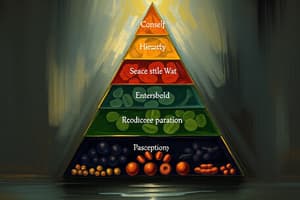Podcast
Questions and Answers
Maslow's Hierarchy of Needs includes five levels: physiological, safety, love/belonging, esteem, and self-actualization.
Maslow's Hierarchy of Needs includes five levels: physiological, safety, love/belonging, esteem, and self-actualization.
True (A)
According to Herzberg's Two-Factor Theory, hygiene factors contribute to job satisfaction and motivation.
According to Herzberg's Two-Factor Theory, hygiene factors contribute to job satisfaction and motivation.
False (B)
Equity Theory focuses on the comparison of individuals' inputs and outcomes to those in different situations.
Equity Theory focuses on the comparison of individuals' inputs and outcomes to those in different situations.
False (B)
Herzberg's Two-Factor Theory emphasizes the importance of motivators like working conditions and salary in employee satisfaction.
Herzberg's Two-Factor Theory emphasizes the importance of motivators like working conditions and salary in employee satisfaction.
Organizational justice theory is also known as equity theory within organizational psychology.
Organizational justice theory is also known as equity theory within organizational psychology.
According to Maslow's Hierarchy of Needs, higher-level needs can be addressed before basic physiological needs are satisfied.
According to Maslow's Hierarchy of Needs, higher-level needs can be addressed before basic physiological needs are satisfied.
Theory X assumes that employees inherently like work and seek responsibility.
Theory X assumes that employees inherently like work and seek responsibility.
Managers who adhere to Theory Y tend to adopt an authoritarian leadership style.
Managers who adhere to Theory Y tend to adopt an authoritarian leadership style.
According to Theory Y, employees are inherently motivated and lack ambition.
According to Theory Y, employees are inherently motivated and lack ambition.
Theory X emphasizes trust, autonomy, and empowerment as key drivers of employee engagement.
Theory X emphasizes trust, autonomy, and empowerment as key drivers of employee engagement.
Theory Y managers use coercion, threats, and punishment to motivate employees.
Theory Y managers use coercion, threats, and punishment to motivate employees.
Theory X and Theory Y reflect different beliefs about the nature of human motivation and behavior.
Theory X and Theory Y reflect different beliefs about the nature of human motivation and behavior.




